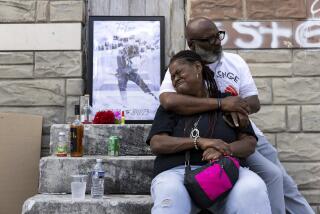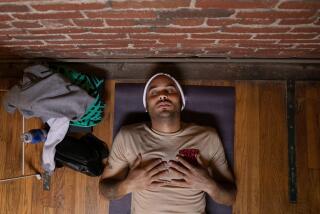A Close- Up Look At People Who Matter : Black Mentor Left Material Success Behind
- Share via
At 33, Garth Gilliam was an African American success story: He had a good job as an engineer at Rockwell International, drove a nice car, lived in a good neighborhood. But instead of being happy, he says, he was troubled.
“I felt a sadness, almost a sense of disgrace that I had made it,” he said. “There were so many of my young black brothers and sisters who didn’t even have a chance.”
Gilliam said he saw himself as one of the lucky ones, coming as he did from a stable, two-parent, middle-class home--a background he believed had primed him for success. He felt a growing sense of obligation, he said, to help other young African Americans who weren’t as fortunate.
So in 1993, he quit his job at Rockwell and went to work as a mentor for an at-risk youth program run by the First United Methodist Church of Pacoima, which he had attended growing up. Two years later, the Shalom Zone Urban Development Project, as the program is called, boasted 17 volunteer mentors serving some 30 boys.
Gilliam, who directs the mentor project, also works for a program called Child SHARE, which matches African American children with foster parents. In recognition of his efforts, the San Fernando Valley Branch of the National Assn. for the Advancement of Colored People tonight will present Gilliam with its President’s Award.
Gilliam said he had to do some soul-searching about whether he was doing the right thing by quitting a high-paying job to work for half the salary. And he recalled driving to the job interview along blighted Van Nuys Boulevard--which was a nice neighborhood when he was growing up.
“I remember thinking, ‘I don’t want to come back here,’ ” he said. “It was depressing.”
But Gilliam said he eventually realized he had a calling. “God was telling me, ‘If you go back to your community and try to rebuild it, I will help you,’ ” he said.
As a mentor, Gilliam drew from the example of his father, Calvin. “I cast him as the perfect father,” Gilliam said. “He was strong, supportive.”
His father’s good example helped keep him out of trouble, Gilliam said, but it didn’t insulate him from racism and the pain it brings. Part of the program deals with helping the boys cope with that pain, said Gilliam, who is married and has a 9-year-old daughter from a previous marriage.
In one exercise, several boys are led blindfolded, tethered together by ropes, through darkness along a steep, treacherous mountain path. The idea, Gilliam says, is to give them a taste of the fear and disorientation that Africans must have felt in the dark holds of slave ships.
In another exercise, the mentors wash the boys’ feet, and “repent for all the men in their lives that have failed them,” Gilliam said.
James, 14, of San Fernando, said he felt uncomfortable about having his feet washed. “I wouldn’t want to wash somebody’s feet,” he said. “So, why should they?”
But after it was all over, James said, “I felt like someone cared for me.”
It’s the satisfaction Gilliam gets from caring--and seeing the difference it makes to the boys--that makes all the sacrifices worthwhile, Gilliam says.
“I wouldn’t give up this job for anything,” he said.
Personal Best is a weekly profile of an ordinary person who does extraordinary things. Please send suggestions on prospective candidates to Personal Best, Los Angeles Times, 20000 Prairie St., Chatsworth 91311. Or fax it to (818) 772-3338.


